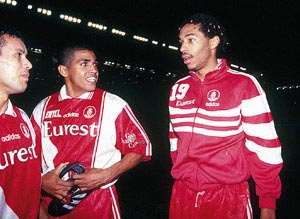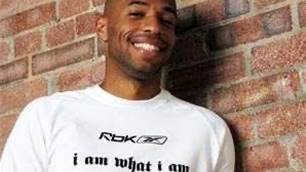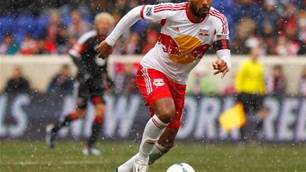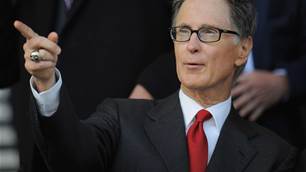Did he suspect match-fixing at Juventus? Was Highbury like a library? And did he really get a man out to hang up a picture?
Page 1 of 4 | Single page
Thierry Henry can’t stop talking. Loquacious at the best of times, today the Arsenal striker has something approaching verbal diarrhoea. Which should be good news for FourFourTwo… but might not be.
We’re in the sweaty basement of a Soho record shop for the launch of Henry’s major new sponsorship deal with Reebok. The theme of the sportswear firm’s campaign is ‘I Am What I Am’ and Henry’s clearly happy explaining exactly who that is. So much so that by the time he’s conducted an hour-long press conference, moved along a row of TV interviewers, faced down a group of national hacks and found time for quick Q&As with assorted foreign journalists, it’s almost 9pm. And he’s still got his one major interview to do: with the FourFourTwo readers.
Fortunately any fears that the Frenchman will be running on empty prove groundless. Flopping down in a chair alongside us, he smiles that insouciant smile, and prepares to reveal the real Thierry Henry.
What do you recall about your childhood in Les Ulis? Did you always have a football at your feet?
Simon Nuttall, via email
Sure, I always had a ball at my feet. Above all, I remember my dad’s encouragement and criticism. Even when I was young he would tell me what I’d done wrong in games. My dad played a big role in my footballing education – at times it was as if I was playing for him. As a kid there’s not much better than making your parents happy. I remember the feeling of walking back to the car after a really good performance, knowing he was going to have a smile on his face because of what I’d done. Not that it happened all that often! He always taught me to never be happy with what you have or what you did – there is always room for improvement. That’s the way I was brought up.
Being Parisian, did moving to the South of France come as a bit of a culture shock? Jerry, via email
It was something of a shock, yes, compared to the Parisian suburbs where I’d grown up. What hit me was how clean everything was and how many flash cars there were. I had the impression that I wasn’t really a part of it, that I didn’t fit in. It was like being on a giant film set, nothing seemed real. I found it hard to get used to it, but Monaco is a nice town, a great place to live.
Are you glad Sonny Anderson was in the Monaco striker’s role, pushing you onto the wing and broadening your education?
Sarah Dawkes, via email
Yes, because I learnt from watching the runs he made. And I learnt other skills from being out wide: it proved beneficial to my career. Playing out wide after always having been a centre-forward taught me things about the game I might not have otherwise learned. But what it taught me above all was that when you’re the centre-forward you’re almost always going to get the headlines. You can be giving your all out wide, doing your best to get the ball over, to set up a goal, but it will always be the man who puts the ball in the net who gets the glory and the attention. Sonny wasn’t like that – he’d be grateful for the work his team-mates put in. But for many people, the press, it was all about the striker. Even if he hadn’t been good, if he scored it would be all about him.
It taught me to be aware and recognise the work of others. Now I’m getting the goals, but I try to highlight the contribution of my team-mates when I score. I think it’s a shame that there’s so much focus on the guy who puts the ball in the net. You can beat three men and put in a cross that needs only poking over the line and still the guy who scored will get all the headlines.
Is it true that your uncle was the French 400-metre hurdles champion?
Iain Spragg, Finchley
I’m not sure if he was the French champion, but he was a really good athlete, really fast. But he did lots of sports. He was on the Everton staff as a physio – Aurelien Henry. The year we did the double [2002], when we beat Everton 4-3 in the final game of the season, he was on their bench.
You would’ve played in the 1998 World Cup Final if Marcel Desailly hadn’t been sent off. How did you feel when you realised that red card had ended your World Cup dream? Did it spoil your celebrations that night?
David Moss, via email
To be honest, it was tough. It was a World Cup Final, after all. The coach, Aime Jacquet had told me to go and warm up at half-time: “You’re going to go on,” he said. A bit of time passed and then he said “OK, five more minutes,” and then the card came out. It’s true that for a fraction of a second I thought “Fuck!” but it certainly didn’t spoil my celebrations – it was an extraordinary triumph.
After the World Cup, you moved to Juventus: what went wrong there?
Ryan White, via email
There’s something I have to say here, something that needs clearing up. People often say I didn’t play much at Juve, but I always played. First of all, I only joined them in January, which explains the limited number of games. I played in all of the remaining 16 games of the season, starting in 13 of them; the first three I was on the bench because the coach, Marcello Lippi, was in the process of deciding to quit the club and thought it best to give me a bit of time. And in the last five or six games, I either scored or set up a goal. One or the other. It’s true that it took me a few games to get used to the system, because we played a 3-5-2 system I wasn’t used to, but I soon adapted and started to play well. I left Juventus for other reasons, which I’ve never wanted to go into. [FFT: But now you’re going to reveal all?] No.
We’re in the sweaty basement of a Soho record shop for the launch of Henry’s major new sponsorship deal with Reebok. The theme of the sportswear firm’s campaign is ‘I Am What I Am’ and Henry’s clearly happy explaining exactly who that is. So much so that by the time he’s conducted an hour-long press conference, moved along a row of TV interviewers, faced down a group of national hacks and found time for quick Q&As with assorted foreign journalists, it’s almost 9pm. And he’s still got his one major interview to do: with the FourFourTwo readers.
Fortunately any fears that the Frenchman will be running on empty prove groundless. Flopping down in a chair alongside us, he smiles that insouciant smile, and prepares to reveal the real Thierry Henry.
What do you recall about your childhood in Les Ulis? Did you always have a football at your feet?
Simon Nuttall, via email
Sure, I always had a ball at my feet. Above all, I remember my dad’s encouragement and criticism. Even when I was young he would tell me what I’d done wrong in games. My dad played a big role in my footballing education – at times it was as if I was playing for him. As a kid there’s not much better than making your parents happy. I remember the feeling of walking back to the car after a really good performance, knowing he was going to have a smile on his face because of what I’d done. Not that it happened all that often! He always taught me to never be happy with what you have or what you did – there is always room for improvement. That’s the way I was brought up.
Being Parisian, did moving to the South of France come as a bit of a culture shock? Jerry, via email
It was something of a shock, yes, compared to the Parisian suburbs where I’d grown up. What hit me was how clean everything was and how many flash cars there were. I had the impression that I wasn’t really a part of it, that I didn’t fit in. It was like being on a giant film set, nothing seemed real. I found it hard to get used to it, but Monaco is a nice town, a great place to live.
Are you glad Sonny Anderson was in the Monaco striker’s role, pushing you onto the wing and broadening your education?
Sarah Dawkes, via email
Yes, because I learnt from watching the runs he made. And I learnt other skills from being out wide: it proved beneficial to my career. Playing out wide after always having been a centre-forward taught me things about the game I might not have otherwise learned. But what it taught me above all was that when you’re the centre-forward you’re almost always going to get the headlines. You can be giving your all out wide, doing your best to get the ball over, to set up a goal, but it will always be the man who puts the ball in the net who gets the glory and the attention. Sonny wasn’t like that – he’d be grateful for the work his team-mates put in. But for many people, the press, it was all about the striker. Even if he hadn’t been good, if he scored it would be all about him.
It taught me to be aware and recognise the work of others. Now I’m getting the goals, but I try to highlight the contribution of my team-mates when I score. I think it’s a shame that there’s so much focus on the guy who puts the ball in the net. You can beat three men and put in a cross that needs only poking over the line and still the guy who scored will get all the headlines.
Is it true that your uncle was the French 400-metre hurdles champion?
Iain Spragg, Finchley
I’m not sure if he was the French champion, but he was a really good athlete, really fast. But he did lots of sports. He was on the Everton staff as a physio – Aurelien Henry. The year we did the double [2002], when we beat Everton 4-3 in the final game of the season, he was on their bench.
You would’ve played in the 1998 World Cup Final if Marcel Desailly hadn’t been sent off. How did you feel when you realised that red card had ended your World Cup dream? Did it spoil your celebrations that night?
David Moss, via email
To be honest, it was tough. It was a World Cup Final, after all. The coach, Aime Jacquet had told me to go and warm up at half-time: “You’re going to go on,” he said. A bit of time passed and then he said “OK, five more minutes,” and then the card came out. It’s true that for a fraction of a second I thought “Fuck!” but it certainly didn’t spoil my celebrations – it was an extraordinary triumph.
After the World Cup, you moved to Juventus: what went wrong there?
Ryan White, via email
There’s something I have to say here, something that needs clearing up. People often say I didn’t play much at Juve, but I always played. First of all, I only joined them in January, which explains the limited number of games. I played in all of the remaining 16 games of the season, starting in 13 of them; the first three I was on the bench because the coach, Marcello Lippi, was in the process of deciding to quit the club and thought it best to give me a bit of time. And in the last five or six games, I either scored or set up a goal. One or the other. It’s true that it took me a few games to get used to the system, because we played a 3-5-2 system I wasn’t used to, but I soon adapted and started to play well. I left Juventus for other reasons, which I’ve never wanted to go into. [FFT: But now you’re going to reveal all?] No.
 |
| Sonny (middle) and Thierry at Monaco |
Related Articles

Henry leaves French coaching role after Olympic silver

Henry delighted with Red Bulls response













